Crossway Bruce A. Ware Collection (5 vols.)
Digital Logos Edition
Overview
This collection by Bruce Ware is filled with lucid, highly readable, and life-changing teaching on Christian theology. In it, there is a theological lesson for everyone. Parents gain a better way to disciple their children. An insightful study on the humanity of Jesus, both in his earthly ministry and in his victory, focuses on this often overlooked truth. The majesty of God’s glory in Scripture is contrasted to the erring formulation of open theists. In this important collection, also keep up-to-date with recent scholarship on Trinitarian theology and its implications for modern life with contributors like Wayne Grudem and Michael Haykin. Readers will find this collection to be highly applicable, intellectually stimulating, and devotionally engaging.

Key Features
- Provides biblically based teaching the nature of the Trinity
- Addresses key issues in contemporary philosophical theology
- Applies theological themes both to doctrine and Christian living
Product Details
- Title: Crossway Bruce A. Ware Collection
- Author: Bruce Ware
- Volumes: 5
- Publisher: Crossway
- Pages: 1,160
- Christian Group: Baptist
- Resource Type: Collected Works
- Topic: Theology
Individual Titles
- Big Truths for Young Hearts: Teaching and Learning the Greatness of God
- God’s Greater Glory: The Exalted God of Scripture and the Christian Faith
- God’s Lesser Glory: The Diminished God of Open Theism
- One God in Three Persons: Unity of Essence, Distinction of Persons, Implications for Life
- The Man Christ Jesus: Theological Reflections on the Humanity of Christ
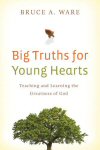
Big Truths for Young Hearts equips parents to guide their young children through all major Christian doctrines in an understandable, chapter-a-day format. Sure, it’s easy to teach your children the essentials of Christian theology when you’re a theology professor. But what about the majority of believers? With Big Truths for Young Hearts, Bruce Ware encourages and enables parents of adolescent children to teach through the whole of systematic theology at a level their children can understand. Parents can teach their children the great truths of the faith and shape their worldviews early, based on these truths.
The book covers ten topics of systematic theology, devoting several brief chapters to each subject, making it possible for parents to read one chapter per day with their children. With this non-intimidating format, parents will be emboldened to be their children’s primary faith trainers. they will perhaps learn a few things themselves along the way.
This is a great book for children and their parents on the classic doctrines of the faith. I heartily recommend it to every parent!
—Dennis Rainey, president and CEO, FamilyLife
My conversion and discipleship as a young girl were significantly influenced by my parents reading to our family a book that taught biblical doctrine to children in a systematic way. The church today must be intentional in passing on to the next generation the core and precious beliefs on which our Christian faith rests. To neglect that responsibility is to leave those who come behind us vulnerable to every wind of (false) doctrine and to risk their rejecting our faith altogether. Big Truths for Young Hearts is a rich resource for parents, teachers, and others who care about helping the next generation know and love God and his ways. In addition to being a theology course for children and young people, it is also a great refresher course for adults.
—Nancy Leigh DeMoss, author, radio host, Revive Our Hearts
Imagine a respected theologian devoting himself to training a new generation of pastors and scholars in the seminary classroom. Now imagine him driving home at night to teach that profound theology in simple terms to his children at their bedsides. Now imagine this father compiling those bedside conversations into a book available to all pastors, parents, and children alike. Imagine no more. My friend Dr. Bruce Ware has done it.
—C.J. Mahaney, senior pastor, Sovereign Grace Church of Louisville, Louisville, Kentucky
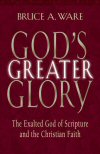
Though in all things God’s Word is the final authority, our Christian tradition, as inherited from centuries of careful reflection and endeavoring to be true to the teaching of Scripture, can greatly enlighten us. Nowhere is this blend of respectful listening to the wisdom of the past and faithfulness to the Bible more necessary than in our contemporary reformulations of the doctrine of God’s person.
Bruce Ware believes that while tradition’s emphasis on God’s metaphysical perfection and his supremacy over the world is correct, we must refine our understanding of the way in which He relates to us. While retaining the deepest concerns of the historic tradition, Ware offers a more rational view of God’s dealings with His children–a view that is reflected in Scripture’s own testimony of Him. Ware then applies this concept of real divine exaltation and real divine-human relationship to the areas of our prayer life, confidence in God and His guidance of us.
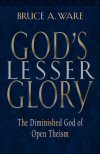
Christians throughout history have been strengthened by their confidence that God knows everything about the future. But consider this: What if it simply is not true? What if God can only rely on His best guess about tomorrow—just as you and I do? Would it not affect your trust in Him, your confidence in facing the future, your worship, and your motivation to leave everything in His hands? And yet this is the consequence that has to be faced if you trust what a number of leading voices in evangelicalism are proposing under the doctrine of open theism.
In its redefinition of the nature of divine providence, open theism adjusts the entire picture of God’s sovereignty and involvement in our lives. Bruce Ware carefully summarizes and critiques this dangerous doctrine from a thoroughly biblical perspective, providing an excellent treatment of both the classical and openness views. He explores their implications and faithfully pinpoints the subtle ways that open theism undermines our trust in God and lessens His glory in our lives.
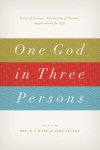
How do the three persons of the Trinity relate to each other? Evangelicals continue to wrestle with this complex issue and its implications for our understanding of men’s and women’s roles in both the home and the church.
Challenging feminist theologies that view the Trinity as a model for evangelical egalitarianism, One God in Three Persons turns to the Bible, church history, philosophy, and systematic theology to argue for the eternal submission of the Son to the Father.
It is interesting to see how theology gets mixed up with ethics and politics. Recently, a number of writers have appealed to the Trinity to argue that just as Father, Son, and Spirit are equally worthy of worship, so man and woman should play interchangeable roles in marriage, the church, and society. Others argue that although the persons of the Trinity are equal, they are not interchangeable. It is not accidental, for example, that the Son, not the Father, came to the earth to die for our sins. And so it is inappropriate to appeal to the Trinity as a model for political and social egalitarianism. One God in Three Persons contains excellent scholarly essays defending this latter view. I find it thoroughly persuasive and I hope it plays a major role in both theological and social discussions.
—John M. Frame, J.D. Trimble Chair of Systematic Theology and Philosophy, Reformed Theological Seminary, Orlando, Florida
This profoundly insightful book is a major contribution to our understanding of the nature of Tri-unity in God. Its focus on the question of whether the Son is both functionally subordinate to the Father and ontologically equal is of crucial importance for the life of the church and our understanding of the relationship between male and female. No attempt to answer that question can be regarded as adequate that does not give serious consideration to the content of this volume.
—Sam Storms, lead pastor for preaching and vision, Bridgeway Church, Oklahoma City, Oklahoma
What a fascinating banquet for all readers, whether agreeing or disagreeing with the common theme that God’s oneness of essence does not negate eternal taxis (or even eternal subordination) within God’s very being. Adding to the delight is that the authors provide a diversity of careful, weighty arguments within the basic harmony of the book.
—J. Scott Horrell, professor of theological studies, Dallas Theological Seminary
I am so grateful Ware and Starke are addressing these issues with such insight and wisdom. I pray that pastors see the important implications of this book and use it to teach their flock that God’s creation of male and female is an extraordinarily beautiful reflection of the unity and diversity of the Trinity.
—Susan Hunt, former director, women’s ministries, PCA
One God in Three Persons is a treasure trove of careful exegesis, theology, church history, and pastoral insight. Ware and Starke have assembled an outstanding team of scholars who have provided an exploration of the Tri-unity of God that is rigorous and refreshing. Furthermore, it is very responsible in its application to questions of male/female relationships in the church and home. Responsible pastors and scholars in this discussion cannot afford to overlook the arguments and applications raised here.
—Rob Lister, associate professor of biblical and theological studies, Talbot School of Theology
John Starke is the pastor of preaching at Apostles Church in New York City, New York.
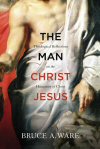
What does it mean for Jesus to be human? Bruce Ware takes readers to the biblical text, where they meet a profoundly human Jesus who faced many of the same difficulties and limitations Christans experience today. Ware explores the significance of Christ’s humanity and assists readers to learn, by the power of the Holy Spirit, to follow in Jesus’s steps. This profound book is perfect for small group settings or teaching, as a resource with which to describe the nuance of Jesus’s dual divine and human nature. Use it for a deep and theologically rich personal devotion. Learn how Jesus’ humanity sheds light on His character and reveals the exciting implications of His victory over sin.
About Bruce A. Ware
Bruce A. Ware is professor of Christian theology at The Southern Baptist Theological Seminary. He has written numerous journal articles, book chapters, book reviews, and coauthored Perspectives on Election: Five Views.